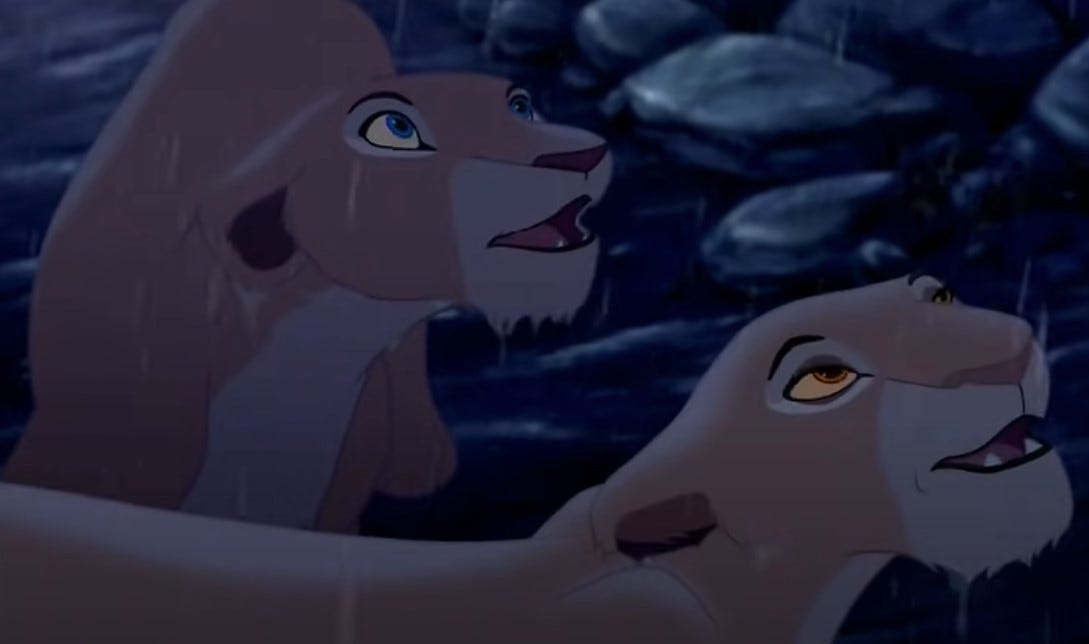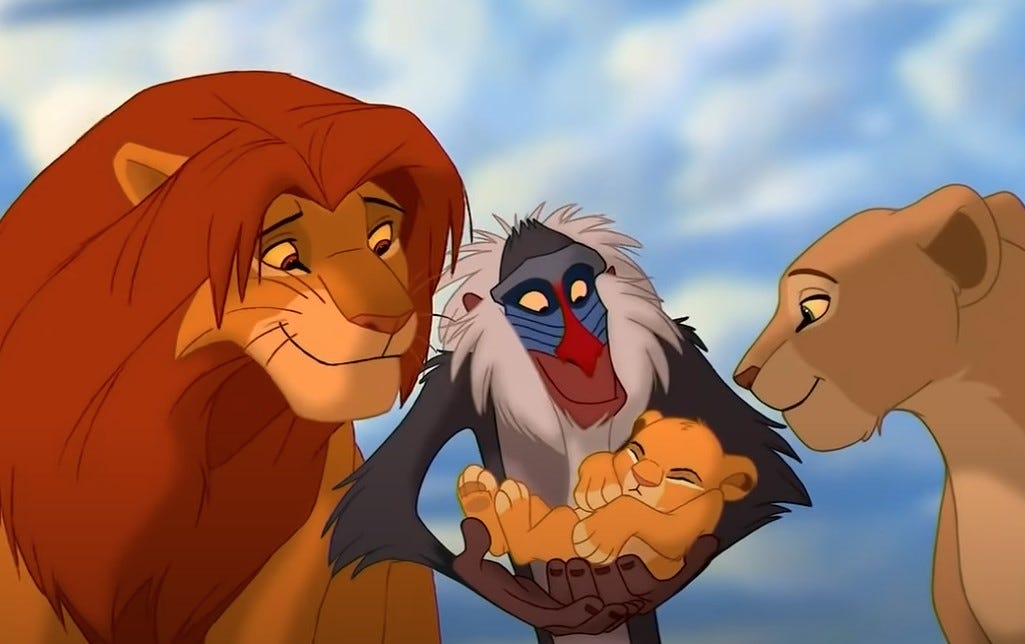Simba’s story is to be considered Disney’s great masterpiece, with a host of shockingly reactionary lessons to offer. The movie constitutes a kind of miracle success story of perennial themes and messages, in the vein of the Peter Jackson’s Lord of the Rings trilogy. With both projects, one has to repeatedly ask oneself, how on earth was a thing like this made in modern Hollywood?
Modeled around the basic story concept of Hamlet, The Lion King turns the tragedy into a comedy, and offers a hopeful prospect for an ailing generation. Sadly, it ended up presenting a road not taken. The millennial generation was fortunate enough to witness Simba’s example in our formative childhood years, but instead of ascending to our place in the great circle of life, most of us stayed with Timon and Pumba, eating bugs.
Hierarchy
Aside from being extremely pro-monarchy, the movie offers us one of the most powerful depictions of fatherhood ever put on film. Mufasa’s character goes straight against all the messaging we have long been exposed to with subversive father-figures in the vein of Homer Simpson – idiots, louts, bums, pathetic little men only fit to be laughed at. But Mufasa demands and deserves respect. Not only is he the literal king of his realm, he is the figurative king of his family. This is borne out by every interaction. His wife respects him, his son looks up to him.
A particularly illustrative moment comes after Mufasa has saved his son from the hyenas, asserting his authority. I am struck by the words, “You deliberately disobeyed me,” and the way how Simba and the audience automatically accept their weight and truthfulness. Living in Modernity, certain fundamental realities are constantly ignored and opposed. One of them is the basic rule: “Father is to be respected.”
But no matter the state of our deracination, as we hear Mufasa’s we are forced to admit that Simba has done something horribly wrong. Instead of encouraging a son to rebel, to “find his own way” and to ignore the patriarch, the movie expects the child to remain obedient to paternal authority. Like a blow of a sledgehammer on the Modern ethos. The Lion King teaches this lesson with such matter-of-fact nonchalance that it can be easy to miss. But even if unconscious, it leaves a lasting example in a viewer’s mind.
Men and women
The romance in the film is founded on an arranged marriage, which the young initially scoff at and find off-putting, but as the story progresses, they come to relish their match and fall deeply in love within the arrangement set up by the elders.
Through the visual symbolism of Simba’s and Nala’s play-fighting, we get to witness how the girl has the position of power initially, while both are young. As their relationship progresses and they mature, we are offered a re-enactment of the same rolling and tumbling. But now the man has become the dominant party and the woman is pleased to surrender to him, giving him a joyful kiss (or lick) on the cheek.
The theme reaches its high-point with Simba’s ascension, and with the look on Nala’s face. Getting to witness an ascent to responsibility – to whatever it is that kingship comes to signify in a man’s life – is what the women closest to him most yearn for. Here the awe and elation of seeing a husband or son taking up a kingly position of authority is perfectly depicted in the women’s eyes. No other movie I’m aware of better depicts woman’s desire to be able to look up to her man.
Nala also constitutes Simba’s inspiration and motive for change. Without her he would have had no drive or momentum. Womanhood pushes manhood into action, into accepting responsibility. In this way, the sexes form a positive feedback loop: the woman motivates the man to become kingly, and the man’s kingliness is the woman’s great joy and fulfillment.
Hedonism
When Nala arrives, Simba has been living the archetypal millennial life, centered around friends, irresponsibility, hedonism, lack of coherent identity, general rootlessness. The allure of “Hakuna Matata” is sympathetically presented, and we can’t help but understand Simba and the temptation he and his millennial contemporaries have fallen into.
Probably through some great work of Providence this movie was offered to the millennial generation during their most formative childhood years, as if to inoculate them against the intense cultural decay that was to hit them as they grew up. Unfortunately, The Lion King was not enough to save them. Instead of Pride Rock, the millennials as a cohort chose the jungle and the ethos of Hakuna Matata.
What did Simba have that most millennials lacked? Why did he get out while most stayed? Surely one major component is a good woman. Simba had Nala – still tied to tradition, encouraging her man towards responsibility and kingliness. Most millennials weren’t as fortunate.
Another factor is childhood example. How many millennials have good fathers? How many millennials were taught to respect their ancestors? How many were taught that the world has a vertical axis and a supernatural dimension that points at immortality? How many look at the stars in the sky and see something more than “perpetually exploding gas balls”? The laughter of Timon is archetypal: it represents the flippant irony the generation is seeped in. The moment a friend brings up something somber and authentic it is ridiculed by his peers and forced into a joke.
The attractions of Hakuna Matata are real, as those of hedonism and epicureanism have always been. It can be tempting to place friends before family, and “bros before hoes”. Likewise tempting to respond to hardship and pain by ignoring it or placating it by opiates. But it is a fake solution that will lead to the breakup of tradition, generation, and identity.
Even the best of friends can never offer you spousal love, or give you children. Only with a wife can you become one flesh. Only within tradition can you find you place in the Circle of Life.
Tradition and identity
Taken as a whole, and heightened at its very first and last minutes, the movie can be understood as a lesson in the importance of generational heritage. Not only do our fathers have authority over us, so do our fore-fathers. Even when they die, our fathers are never truly dead – they live on both supernaturally and naturally: in heaven (as represented by the stars in the film), and in us.
Past generations have a say on our decisions, and they place a responsibility on us. It is this generational structure that gives us a core part of our identity, a sense of rootedness. When questioned by Nala, Simba says he wants his “independence”, to have “his own life”. When probed further he gets angry, saying “You can’t tell me how to live my life”. This is exactly the millennial state of mind, prefigured already in 1994.
The trouble is, ‘independence’ is often only a code word for selfishness. Likewise, the desire to have ‘my own life’ often boils down to a call for self-centeredness, and dodging of responsibility.
But there is a price to pay. Without the acceptance of heritage – shirking one’s place in the circle of life – one’s identity becomes hollowed out, uprooted, flat, lost. It is tradition that gives us coherence and direction. Knowledge of self comes from the acceptance of the gifts and bonds of tradition.
“Simba. You have forgotten me. You have forgotten who you are and so forgotten me. Look inside yourself, Simba. You are more than what you have become. You must take your place in the circle of life. Remember who you are.”
These words ought to be enough to explode the Hakuna Matata ethos from the mind of anyone who isn’t too far gone. Rarely has a more important lesson been taught as powerfully, and to as needful an audience.
The words are stern, but also encouraging. We live in ‘year zero’, a world where history (if referred to at all) begins at 1945, and where our patriarchs are presented as irrelevant laughingstocks. But even in a dark jungle like this, anyone who feels lost can re-establish a sense of coherence by turning back to their origins. By endeavoring to Remember.








One of the most important and well written essays of recent times! Well done good sir, this really got me thinking about how much harm modernity has done to my generation and how it has not only proven punishing and horrible for men but also for the women of our generation!
We men ought to take up the duties and dignity that a knight, a king, or even a priest might once have endeavoured towards, as implied here. Thanks so much for having written it!
A tight, incisive analysis of the crown jewel of Disney animated films. Why? Because of it unabashed positive treatment of fatherhood.